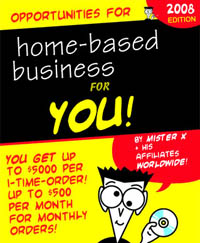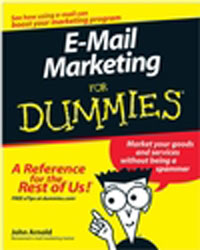« What Happened to Inga? | Main | Sometimes I Simply Don't "Get" Spammers »
| Home | The Book | Training | Events | Tools | Stats |
May 12, 2008
Why "Home Business" Spam Sticks in My CrawI know that I preach consent over content when it comes to identifying spam. Automated email of any kind sent to my inbox without my prior consent is spam. Period. So why am I singling out the content of a particular class of spam? Unfortunately, some spam gets through server filters, and enough recipients keep reading and responding to the crap that it keeps spammers in business. For less-spam-sensitive email users out there who haven't received a dose of Email Safety 101, content matters because they read the junk that hits their inboxes.
And that's where the "home business" spam category comes into play. For decades before email ubiquity, the "home business" ploy was advertised heavily in magazine classified ads and even on street light poles. It wasn't too many months ago that I saw an envelope stuffing business proposition duct-taped to a left turn lane traffic light pole near my home (bound to be seen by at least the driver of the first car waiting for the interminably slow green arrow). Email simply allows notices to be duct-taped to millions of computer screens around the world in an instant.
What irks me most about propositions in this category is that they prey on the recipient's belief in the American Dream. Although the precise definition of "American Dream" is hard to pinpoint, in its widest sense, it represents an opportunity to improve one's prosperity, even if it means some hard work in the process. Someone who earns a fixed salary, is under-employed, or is unemployed is an easy target for hucksters who dangle before his or her eyes visions of extra income or freedom from the shackles of the current job rut.
With such a huge target market for the Dream—who doesn't want to get ahead?—it's up to the advertiser to get the recipient's attention. In the email inbox, the main attention-grabber is the Subject: line. The success of the Subject: line's appeal is measured by how many recipients open the message. Pre-email, a printed advertising piece's headline was the "grabber." Direct mail consultants and professionals exerted enormous energy on perfecting just the right headlines that did the best job of engaging recipients.
I was reminded of this the other day when I happened upon a message in my server "spam suspects" folder whose subject line was:
Subject: Danny: IS THE LIFE OF A CHILD WORTH $1 TO YOU?
My first thought was that Sally Struthers had begun spamming for her charity. But, as I'll show you in a moment, the message had nothing to do with children or the poor. The disconnect between subject and message content was so enormous, I was curious to see if the Subject: line had been used much elsewhere, especially in charity appeals. What turned up in the Google search instead were dozens of links to collections of the most effective advertising headlines, where this exact headline appears as a way to tug at the recipient's heartstrings.
Now to the message content associated with "the life of a child." Because my "spam suspects" are gathered together only in their source code form, I make it easy on myself to scan the message body's contents (and headers, for that matter). This message was presented in HTML format only, and consisted of a single image, surrounded by a link. There was no identifiable text, but the domain of the link ended in the letters "mlm."
MLM is the acronym for "multilevel marketing." You can read the Wikipedia entry for an overview on the subject. MLM is not inherently a bad thing. Some well-known brand name MLM companies have passed Federal Trade Commission scrutiny in the United States. But less-scrupulous MLM outfits out there have given the FTC plenty of enforcement work over the years. My sense of the matter is that as long as end users receive a product or service commensurate with the money paid and if individuals in the selling chain are treated fairly and honestly, then there isn't much to worry about.
The problem, however, is that, as history has proven, those promoting MLMs aren't always the most forthright. There are tons of weblogs on the subject, and plenty of public comments from victims who tried to become part of a network (or "downstream") only to find that it was either way too much work or even impossible to make a meaningful stab at working as promoted by those selling the Dream. Massive flame wars then ensue between those who sell MLM systems and those who believe it's all a load of crap.
Getting back to the spam message in my "suspects" folder, the spamvertised domain name is registered to an individual whose stated address is a Chicago hi-rise residential building (I used to live not far away in another building). The email address of the supposed registrant referred to a domain registered in the British Virgin Islands.
I was looking at this message about a week after it had been sent. After seeing that retrieval of the lone image was not coded with any identifiers, I viewed only the image to see what this sender was up to. I expected the worst, and was amply rewarded:
Look familiar? Here's the prototype from the originator of the look and cartoon character (currently John Wiley & Sons, one of my publishers [noted for disclosure purposes]):
Draw your own conclusions about the originality of the advertisement. Irrespective of the look-and-feel, the content fails CAN-SPAM requirements for identification and opt-out provision.
The ad, itself, promotes something by "Mister X." Oooh, mysterious. Sounds to me like yet another advertisement for somebody's "system" that promises you riches. Whenever somebody attempts to sell you a system for making money, rather than selfishly using the system to clean up for himself, it means that there is more money in selling the system than in using it. It reminds me of the outfit that uses cable television news programs hourly to advertise owning precious metals. The "sure thing" is acting as the broker for the gold coins, not holding them during the ups and downs of the market.
Too many of the internet-based "home business" opportunities sell information that instructs buyers to sell information that instructs the next generation of buyers to sell information that instructs buyers.... If not necessarily pyramidal in shape, the scheme is certainly reminiscent of the legendary keester bird: an avian species that flies in ever smaller circles until it flies up its own butt and disappears from the planet.
Along with your money. And Dream.
Posted on May 12, 2008 at 05:17 PM


